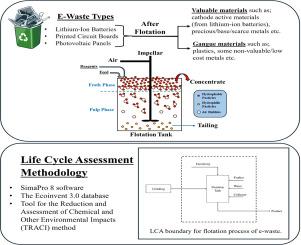A review and environmental impact analysis on the current state of froth flotation on recycling of e-wastes
IF 11.2
1区 环境科学与生态学
Q1 ENGINEERING, ENVIRONMENTAL
引用次数: 0
Abstract
The current recycling methods to recover metal contents from electronic wastes (e-wastes) are primarily chemical based, such as hydrometallurgy, pyrometallurgy. These methods typically do not involve pre-treatments to remove non-metallic components, which causes increasing reagent and energy consumption, and greenhouse gas emission during recycling. Mechanical methods exploiting differences in material properties, such as gravity, magnetic, electrostatic, can achieve pre-treatment which receive increasing attention. Amongst different mechanical methods, froth flotation utilizing surface hydrophobicity to achieve the desired separation appears to receive less attention but can be very promising to recycle a variety of e-wastes. In this work, the challenges and advances in the recovery of metals from three main e-wastes, including spent lithium-ion batteries (S-LIBs), waste printed circuit boards (WPCBs), and spent photovoltaic solar panels (S-PVs), using flotation were reviewed. The work also conducted a life cycle analysis to assess the environmental impact of flotation in recycling these e-wastes. According to TRACI standards, flotation reagents have the highest environmental impact compared to electricity and water consumption. The study suggests that flotation can serve as an effective pre-treatment operation prior to the chemical treatment to improve the overall the e-waste recycling but future research is still needed.

泡沫浮选法对电子废物回收利用现状的回顾和环境影响分析
目前从电子废物(e-wastes)中回收金属成分的回收方法主要以化学方法为主,如湿法冶金和火法冶金。这些方法通常不涉及去除非金属成分的预处理,导致试剂和能源消耗不断增加,并在回收过程中排放温室气体。利用材料特性差异(如重力、磁力、静电)的机械方法可以实现预处理,受到越来越多的关注。在各种机械方法中,利用表面疏水性实现理想分离的泡沫浮选法似乎较少受到关注,但在回收各种电子废物方面却大有可为。本研究综述了利用浮选法从三种主要电子废物(包括废锂离子电池(S-LIB)、废印刷电路板(WPCB)和废光伏太阳能电池板(S-PV))中回收金属所面临的挑战和取得的进展。这项工作还进行了生命周期分析,以评估浮选在回收这些电子废物时对环境的影响。根据 TRACI 标准,与耗电量和耗水量相比,浮选试剂对环境的影响最大。研究表明,浮选可作为化学处理前的有效预处理操作,以改善电子废物回收利用的整体效果,但仍需进行进一步研究。
本文章由计算机程序翻译,如有差异,请以英文原文为准。
求助全文
约1分钟内获得全文
求助全文
来源期刊

Resources Conservation and Recycling
环境科学-工程:环境
CiteScore
22.90
自引率
6.10%
发文量
625
审稿时长
23 days
期刊介绍:
The journal Resources, Conservation & Recycling welcomes contributions from research, which consider sustainable management and conservation of resources. The journal prioritizes understanding the transformation processes crucial for transitioning toward more sustainable production and consumption systems. It highlights technological, economic, institutional, and policy aspects related to specific resource management practices such as conservation, recycling, and resource substitution, as well as broader strategies like improving resource productivity and restructuring production and consumption patterns.
Contributions may address regional, national, or international scales and can range from individual resources or technologies to entire sectors or systems. Authors are encouraged to explore scientific and methodological issues alongside practical, environmental, and economic implications. However, manuscripts focusing solely on laboratory experiments without discussing their broader implications will not be considered for publication in the journal.
 求助内容:
求助内容: 应助结果提醒方式:
应助结果提醒方式:


